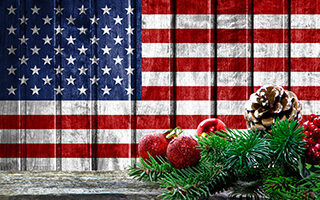
Once again, the holiday season is here, calling us to gather with family and friends to celebrate traditions, share stories and give gifts. It’s in our DNA, this drive to “come home” once a year.
But it’s a calling that can’t always be heeded, especially by those we ask to keep us safe and protect our interests—our soldiers. Their commitment to our country doesn’t follow a calendar, and those stationed far from home may not be able to spend the holidays with family.
And when our nation is engaged in a conflict, our troops still serve on the days other Americans have off from their work. This week, let’s look at a few examples of action during the holidays.
Crossing the Delaware. After months of defeat in battle, Continental Army General George Washington finally settled on a different approach in his fight against the British. On the night of December 25, 1776, Washington and about 2,400 of his troops crossed the icy Delaware River, hoping to take advantage of the element of surprise. The goal was to catch Hessian troops (Germans hired by the British) off guard while they were celebrating Christmas. Early the next morning, Washington and his forces descended upon the Hessians and did just that. One-thousand Hessians were captured. And even though it wasn’t a huge victory, it helped lift the spirit of America’s revolutionary fighters.
The Christmas Pardon. On December 25, 1889, men who had once fought as rebel soldiers under the Confederacy were granted a full pardon under U.S. President Andrew Johnson’s Proclamation 179. Johnson, along with President Abraham Lincoln a few years earlier, had been extending such offers to former Confederates since the end of the Civil War in 1865. But the offers always came with certain conditions, and they weren’t open to all who fought under the Confederacy. Johnson’s Christmas Pardon—as it become known—granted amnesty to “all and every person.”
Holiday in the trenches. In the week leading up to December 25, 1914, soldiers on the Western front of WW I suddenly became enraptured with the holiday spirit. French, British, Belgian and German soldiers put down their weapons and started shouting holiday greetings to each other across the trenches. Some say men even sang holiday carols. By December 25, many walked out across the trenches to shake hands and exchange gifts of cigarettes and rations. It’s considered the last example of soldiers in battle acting as such and has become known as the Christmas Truce of 1914.
Here’s to our troops this holiday season, and for anyone who ever awaited the return of their loved one from some far-off corner of the world. Veteran Energy wishes all of you a merry Christmas, happy Hanukkah, Solstice, Kwanzaa or Festivus.


